Interactions of the African Economic Area

Relations of the African Economic Area-World Civilizations: Western, Islamic

Analysis of the Economic Interactions of the African Civilization with:
- Islamic Civilization
- Hindu Civilization
- Western Civilization
- Sinic Civilization
- Buddhist Civilization
- Orthodox Civilization
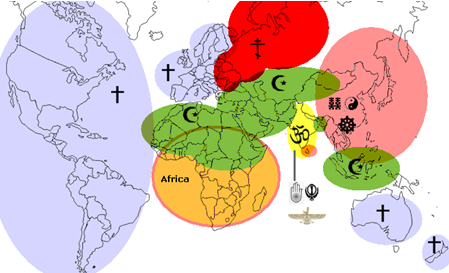

The Subject “Interactions of the African Economic Area with the World” belongs to the following Online Programs taught by EENI Global Business School:
Doctorate in African Business, Ethics, Religions & Business, World Trade.
Master in Business in Africa, International Business.
Courses: Christianity & Business, Islam & Business.
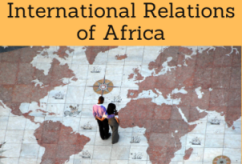

EENI Partnerships with Educational Institutions
Languages:  or
or  Civilization Africaine
Civilization Africaine  Civilizações
Civilizações  Africa Interacciones.
Africa Interacciones.
Interactions of the African Civilization with the other civilizations.
Analysis of the International Relations of Africa and interactions between the different African Economic Areas:
- West African Economic Area
- Central African Economic Area
- Southern African Economic Area
- East African Economic Area
- Maghrebian Economic Area
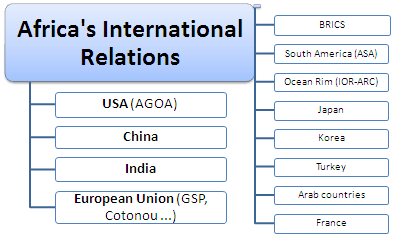

Interactions of the African Civilization with the Islamic Civilization.
Algeria, Benin, Burkina Faso, Cameroon, Chad, the Comoros, Ivory Coast, Egypt, Gabon, the Gambia, Guinea, Guinea-Bissau, Libya, Mali, Morocco, Malawi, Mozambique, Niger, Nigeria, Senegal, Sierra Leone, Somalia, Sudan, Togo, Tunisia, Uganda, and Djibouti are members of the Organization of Islamic Cooperation. Namely, twenty-seven of the fifty-seven members of the OIC are African Countries. These countries are also members of:
- Islamic Centre for Development of Trade
- Standing Committee for Economic and Commercial Cooperation
- Islamic Chamber of Commerce
- Statistical, Economic and Social Research and Training Centre
- Of all the African Countries, only Morocco has signed the Framework Agreement + PRETAS (Protocol on the Preferential Tariff Scheme) + Rules of origin
- Seventeen African Countries (Egypt, Guinea, Mauritania, Niger, Sudan, Somalia, Tunisia, Sierra Leone, the Gambia, Guinea-Bissau, Burkina Faso, Cameroon, the Comoros, Djibouti, Benin, Nigeria, and Ivory Coast) have signed the Framework Agreement + PRETAS
- Chad, Gabon, Libya, Senegal, and Uganda only have signed the Framework Agreement
- Algeria, Mali, Mozambique, and Togo they not yet ratified the Agreement
Libya, Mauritania, Morocco, Mozambique, Senegal, Sierra Leone, Somalia, Sudan, Togo, Tunisia, Uganda, Niger, Chad, Benin, Algeria, Burkina Faso, Cameroon, the Gambia, Mali, Nigeria, the Comoros, Ivory Coast, Djibouti, Gabon, Guinea, Guinea-Bissau, and Egypt are members of the Islamic Development Bank.
All the African Countries are beneficiaries of the Arab Bank for Economic Development in Africa (BADEA), the African Countries members of the Arab League are also members of the BADEA.
Algeria, the Comoros, Djibouti, Egypt, Libya, Morocco, Mauritania, Somalia, Sudan, and Tunisia are members of the Arab League, namely, ten of the twenty-one members of the Arab League are African Countries.
All the nations of the African Union and all the countries of the Arab League are part of the Afro-Arab Cooperation.
Algeria, the Comoros, Djibouti, Egypt, Libya, Morocco, Mauritania, Somalia, Sudan, Syria, and Tunisia belong to the Summit of South American-Arab Countries (ASPA) and the Asia-Middle East Dialogue (AMED).
Egypt, Morocco, and Tunisia are part of the Agadir Agreement.
Mauritius has a Preferential Trade Area with Pakistan.
Turkey has Trade Agreements with Morocco and Tunisia.
Africa-Turkey Partnership. The African Union considers Turkey as a strategic partner for Africa.
Algeria, Chad, Egypt, Guinea, Libya, Mali, Mauritania, Morocco, Niger, Senegal, Sudan, Somalia, Tunisia, Ivory Coast, Sierra Leone, Gabon, the Gambia, Guinea-Bissau, Uganda, Burkina Faso, Cameroon, the Comoros, Djibouti, Benin, Nigeria, Mozambique, and Togo are the main the African Countries receptors of the Arab Development Funds.
- The African Countries of the Arab League are beneficiary members of the Arab Fund for Economic and Social Development and the Arab Monetary Fund
- These countries can benefit from the Arab Trade Financing Programme, Abu Dhabi Fund, and Kuwait Fund
- Algeria, Gabon, Libya and Nigeria are members of the OPEC Fund for International Development
Interactions of the African Civilization with the economic areas of the Western Civilization.
- SPG of the EU
- The African Countries beneficiaries of the scheme Everything But Arms (EBA) of the EU are Angola, Chad, the DR Congo, the Comoros, Niger, Djibouti, Lesotho, Rwanda, Benin, Equatorial Guinea, Liberia, Eritrea, Madagascar, São Tomé, Togo, Burkina Faso, Ethiopia, Malawi, Senegal, Burundi, the Gambia, Mali, Sierra Leone, Uganda, Kenya, Guinea, Mauritania, Somalia, Cape Verde, Guinea-Bissau, Mozambique, Sudan, South Sudan, the Central African Republic, Tanzania, and Zambia
- Cape Verde is a beneficiary of the SPG+
- All the countries of Sub-Saharan Africa are beneficiaries of the Africa-EU Partnership of the EU
- Egypt and all the Maghrebian Countries are part of the Euro-Mediterranean Partnership (EUROMED) and the European Neighborhood Policy (Mauritania is not included)
- The EU has Economic Partnership Agreements with Algeria, Ivory Coast, Egypt, Morocco, Tunisia, Cameroon, and Ghana
- The EU has a Trade Agreement with South Africa
- The EFTA has trade agreements with Egypt, Morocco, Tunisia, the Southern African Customs Union (SACU)
- Almost all the African Countries (except Sudan or Zimbabwe) are beneficiaries of the AGOA of the U.S.
- The U.S. also has a trade and investment agreements with the West African Economic and Monetary Union (WAEMU), the East African Community (EAC), the Common Market for Eastern and Southern Africa (COMESA) and a Free Trade Agreement with Morocco
- MERCOSUR-Southern African Development Community (SADC) Trade Agreement
- MERCOSUR-Egypt Trade Agreement
- All the countries of the African Union are members of the Africa-South America Summit
Interactions of the African Civilization with the Sinic Civilization.
Interactions of the African Civilization with the Hindu Civilization.
- Africa-India Cooperation
- Bharat (India) has an agreement with the Southern African Customs Union (SACU)
- India-Mauritius Agreement is fundamental and acts as a bridge between India and the African Markets
- India has Trade Agreements with several African Countries: Angola, Botswana, Cameroon, Ivory Coast, Ghana, Liberia, Mozambique, Nigeria, Rwanda, Senegal, South Africa, Eswatini, the Seychelles, Tanzania, Uganda, Zambia, and Zimbabwe
- Asia-Africa Corridor
Interactions of the African Civilization with the Buddhist Civilization.
- Africa-Korea Partnership
- Japan promotes its trade relations with Africa through the Tokyo International Conference on African Development
Multi- civilizations interactions of the African Civilization.
- Africa-Asia Strategic Partnership
- Africa-BRICS Cooperation (South Africa is a BRICS Country)
- The Comoros, Kenya, Madagascar, Mauritius, Mozambique, the Seychelles, South Africa, and Tanzania are members of the Indian-Ocean Rim Association
Sample: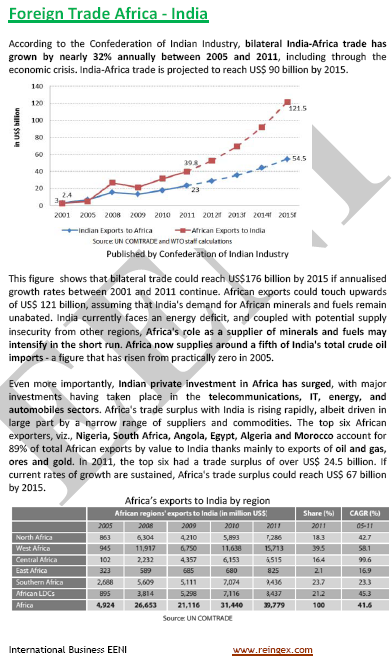
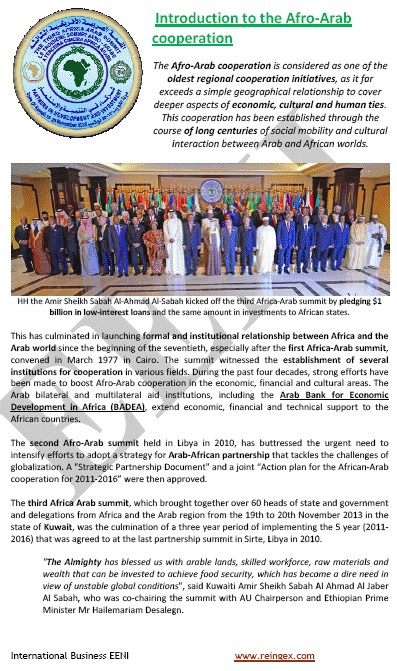
(c) EENI Global Business School (1995-2024)
We do not use cookies
Top of this page



